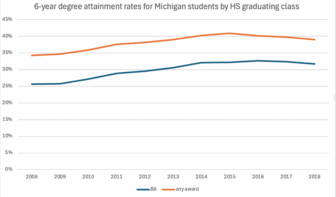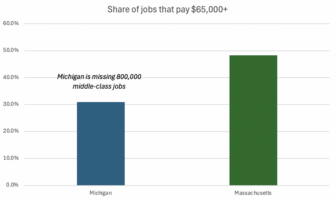Just back from a week in beautiful – but rainy – northern Michigan. As I was leaving I circulated a terrific column by Rick Haglund (read it here). It once again provides evidence that lower taxes is not a path to economic success.
Quite surprising it reports that the Tax Foundation – a conservative think tank – rated Michigan with the seventeenth best business climate. Up from twenty eight the year before. Better business climate rating, worse economy. Why can’t folks accept that business taxes have little to do with a state’s economic performance?
A flurry of e mails ensued. Wonks who I associate with are clearly engaged in the debate on the role of taxes in driving economic growth. Mark Murray, Meijer’s President, responded with a question: “why am i spending so much time writing about taxes, when the Michigan Future agenda is focused on public investments?”
As usual, Mark is right. We are debating the wrong issues. And I get sucked into that debate. If you care about recreating a high prosperity Michigan what is most important for state, regional and local policy makers to get right are public investments. Primarily in education and quality of place.
The two that matter most are higher education and central cities. Two areas that have been near the top of the chopping block during a decade of budget cutting in Michigan. Our higher education system – anchored by three terrific research universities – is arguably the best asset Michigan has to grow a knowledge-based economy. And vibrant central cities are essential in retaining and attracting talent that is the driving force of economic growth across the country.
The only reason to spend so much time on taxes is until we get it off the table as the default answer to how to grow the economy, we can’t get to what really matters: preparing, retaining and attracting talent. And the public investments that can most help us grow the Michigan economy.






